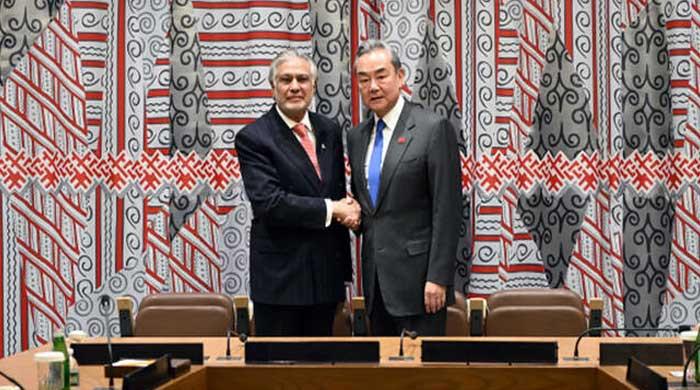FATF delegation to visit Pakistan on August 13: sources
The purpose of the visit is to have a detailed review of a report submitted to the global watch dog by Islamabad, the sources say
August 08, 2018
ISLAMABAD: A delegation of Financial Action Task Force (FATF) will arrive in Pakistan on August 13 to review implementation of an action plan it issued to Islamabad earlier this year, diplomatic sources informed Geo News.
The delegation, comprising members of Asia Pacific Group on Money Laundering, will be visiting the country from August 13 to 16, according to sources.
They said the purpose of the visit is to have a detailed review of a report submitted to the global watch dog by Islamabad.
The delegation would also be briefed by officials of National Counter Terrorism Authority (NACTA) and other relevant authorities, the sources added.
Officials would also brief the delegates on measures taken by Pakistan against terror financing, according to the sources.
In June, Pakistan was formally added to the grey list of countries involved in providing monetary assistance to terrorism and related causes after a FATF meeting in Paris.
According to FATF’s statement, following the decision Pakistan had committed to "address its strategic counter-terrorist financing-related deficiencies."
The statement had said that Islamabad would work to implement its action plan to accomplish these objectives, including by:
1) Demonstrating that terrorist financing risks are properly identified, assessed, and that supervision is applied on a risk-sensitive basis
2) Demonstrating that remedial actions and sanctions are applied in cases of AML/CFT violations, and that these actions have an effect on AML/CFT compliance by financial institutions
3) Demonstrating that competent authorities are cooperating and taking action to identify and take enforcement action against illegal money or value transfer services (MVTS)
4) Demonstrating that authorities are identifying cash couriers and enforcing controls on illicit movement of currency and understanding the risk of cash couriers being used for terrorist financing
5) Improving inter-agency coordination, including between provincial and federal authorities, on combating terrorist financing risks
6) Demonstrating that law enforcement agencies (LEAs) are identifying and investigating the widest range of terrorist financing activity and that terrorist financing investigations and prosecutions target designated persons and entities, and persons and entities acting on behalf or at the direction of the designated persons or entities
7) Demonstrating that terrorist financing prosecutions result in effective, proportionate and dissuasive sanctions and enhancing the capacity and support for prosecutors and the judiciary
8) Demonstrating effective implementation of targeted financial sanctions against all 1267 and 1373 designated terrorists and those acting for or on their behalf, including preventing the raising and moving of funds, identifying and freezing assets (movable and immovable), and prohibiting access to funds and financial services
9) Demonstrating enforcement against targeted financial sanctions violations including administrative and criminal penalties and provincial and federal authorities cooperating on enforcement cases
10) Demonstrating that facilities and services owned or controlled by designated persons are deprived of their resources and the usage of the resources.
Earlier, the Securities and Exchange Commission of Pakistan (SECP) in compliance with the FATF's recommendations had issued the Anti-Money Laundering and Countering Financing of Terrorism Regulations, 2018.
Prior to that, on June 8, the National Security Committee (NSC) had reaffirmed its commitment to cooperate with the FATF and strive towards realising "shared objectives."
FATF, a global body that combats terror financing and money laundering, had taken the decision to place Pakistan on its grey list during a plenary meeting in February this year.
The country was also included in the list from 2012 to 2015.











